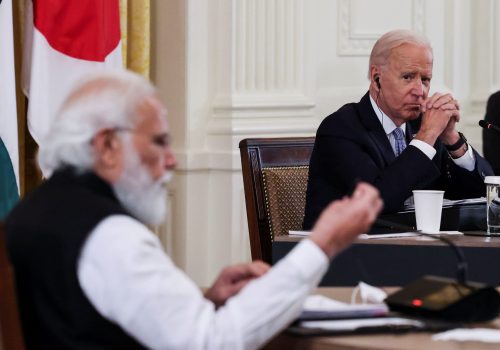FAST THINKING: What will the infrastructure bill actually do?
GET UP TO SPEED
They took the long road. The US House of Representatives on Friday night passed a bipartisan bill to upgrade the nation’s roads, bridges, airports, public transit, broadband connections, drinking-water pipes, and more, sending the package to US President Joe Biden’s desk after several months of wrangling. What does this soon-to-be law mean for the US economy and its place in the world? Are fears of inflation justified? What message does this send to China? Our crack economics team is here to break down what matters.
TODAY’S EXPERT REACTION COURTESY OF
- Josh Lipsky (@joshualipsky): Director of the GeoEconomics Center and former International Monetary Fund official
- Julia Friedlander (@jfriedlanderdc): C. Boyden Gray senior fellow, director of the Economic Statecraft Initiative, and former senior US Treasury Department official
‘Infrastructure week,’ at last
- “This is a big deal,” Josh tells us, because for decades presidents of both parties have sought an infrastructure overhaul without success. But “both the price tag and the name are a little misleading,” he adds.
- That’s because the roughly one-trillion-dollar cost will be spread out over eight years, coming in around $120 billion annually—roughly the same as the Department of Homeland Security spent this year. And “infrastructure” here means much more than the traditional image of roads and railways. “The bill makes major investments in broadband and electric vehicles,” Josh says. “It’s a new way of thinking about infrastructure that reflects the way work is changing across the country.”
- Julia foresees an economic boost, but not right away, given the nature of infrastructure spending. “Spend $1.3 trillion now, see the results in five to ten or even twenty years when the projects near completion,” she says. “Hurry up and wait. Sure, but in America, we’ve waited long enough to begin.”
Inflated expectations
- The House now expects to vote on Biden’s social-spending bill—which tackles everything from climate change to free preschool—next week, with the Senate to follow. Josh points out that the Biden domestic agenda this year has had three pillars: a pandemic-driven stimulus bill, an infrastructure bill, and the social-spending measure. “With this bill, he’s got two out of three, but there’s a reason they saved the families plan for last,” he says. “It’s going to be a much harder fight.”
- Republicans and some moderate Democrats have expressed worries about how the infrastructure bill, especially when coupled with a larger social-spending plan, could further juice inflation. But when you put these proposals in context—as the GeoEconomics team does below—it “shows why those fears may be overhyped,” Josh says, as the new programs spread out over a decade represent nothing close to pandemic-era government spending spikes.
Global gamesmanship
- While we are talking about Biden’s domestic agenda, its impact won’t stay within US borders. The infrastructure bill is in part inspired by overseas competitors, particularly China. “For years, Washington looked at crumbling bridges at home and gleaming projects abroad and said, ‘We are falling behind,’” Josh tells us.
- He points out that at the recent Group of Twenty (G20) and UN climate change summits, Biden pitched his Build Back Better World plan, an answer to China’s Belt and Road Initiative. “But you have to take care of business at home before you go building abroad, and last night they did that,” Josh says.
- But selling this effort as part of China competition is “setting a trap for America,” Julia contends. “Such parallels cheapen American achievements and signal that we can only agree when we agree on whom we oppose,” she says. “Improving domestic conditions is not about beating adversaries. It’s about living up to the promise of self-government.”
- That self-government part is key: Julia has picked up on increasing chatter from foreign sources about how “representative democracy is on the brink” in the United States, with Biden’s agenda mired in intraparty warfare. A failure would theoretically “lend credence to more ‘efficient’ or ‘illiberal’ models of governing where government spending and economic policy are not quite so messy,” she says.
- But with one high-wire late-night vote, that narrative suffered a blow, Josh argues: “In a bipartisan way last night, Congress said: ‘Yes, it may be messy, but we can still solve big problems.’”
Further reading
Wed, Oct 20, 2021
US leaders laid down solid and sensible sanctions policy. Now they need to follow through.
New Atlanticist By Daniel Fried, Brian O’Toole
The review is smart in addressing the true root causes of sanctions misuse without indulging in clichés such as that sanctions are overused or never work.
Fri, Oct 8, 2021
US climate investments are required to secure green economy and jobs
Blog Post By
For the US economy to sustainably function and continue creating jobs in the long-term, investments that help manage climate change and prevent further damage to the environment are essential economic policies.
Sun, Oct 3, 2021
Biden should course-correct to embrace global economic, trade deals
Inflection Points By Frederick Kempe
By embracing its global partners economically, the Biden administration would make good on its “America is back” narrative.
Image: House Speaker Nancy Pelosi (D-CA) is pursued by reporters after the House passed the bipartisan infrastructure package at the US Capitol in Washington, DC, on November 6, 2021. Photo via REUTERS/Elizabeth Frantz.


